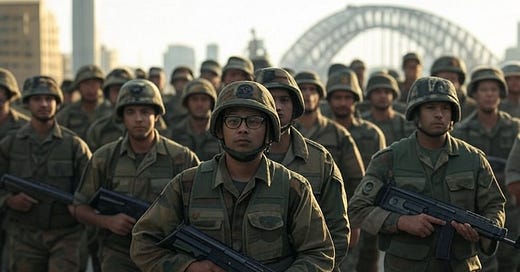Would Indian Migrants Fight to Defend Australia?
Our new subcontinental migrants are not always skilled in the art of assimilation. But they do make up a huge portion of our population. So we need to ask: what would they do if war broke out?
There are now just under a million Indians living in Australia, although in some places, like the CBD of Melbourne, this feels like an understatement.
Indians now make up the nation’s second-biggest migrant cohort. Meanwhile, the number of people in the biggest migrant group, from the United Kingdom, is decreasing. There is a good chance the number of Indians in Australia will exceed Poms in the 2026 Census.
This is a deliberate policy for the Australian government, the explanation for which, on the rare occasions one is offered, is couched in platitudes about aligning ourselves with one of the biggest and fastest growing economies in the world.
This may be true, but it ignores the equally significant effect this has on our society and culture. Indians, to put it bluntly, do not integrate as easily or willingly as Poms and other Christian Europeans.
Indian expat Jayant Bhandari explained why this might be so in an alarming speech to a Property and Freedom Society conference in Turkey last year. When he migrated to Britain as a young man, Bhandari said, he noticed that Indians preferred to re-create their homeland than become part of the society around them. And what they re-created was not good.
“They sought the familiar smells, noise, and constant hustle and bustle. They recreated never-ending emotionalism, fruitless conflicts, chaos, and intellectual inbreeding.
“When we were granted unhindered access to the school in Manchester and later to the office where I worked, my fellow immigrants and I often wondered if the British were so naïve as to trust us so readily. What was to stop us from stealing everything in sight? Most immigrants never truly grasp the significance of ‘trust’ and ‘gratitude’…
“Fairness, justice, trust, empathy, and impartiality are alien to many Indians,” he said. “They have a hard time telling the difference between right and wrong. They are indifferent even when no cost is associated with being fair. Moreover, if they could do good without any personal cost, they would still prefer not to, because that can be seen as a sign of weakness.”
If they are that disinclined to assimilate, what are the odds they would fight to defend their new home?
With Chinese ships lurking off our coast, and the prospect of war increasing by the day, I thought it was time to visit Wentworthville, in western Sydney, to ask the mostly Indian locals what they would do in the event of war:
There is a natural bias to these vox pops. The people who agree to be interviewed by a stranger on the street are generally agreeable types, which is a characteristic that increases the likelihood of being prepared to join a defence force. For every one of these blokes who agreed to be filmed, there was another who brushed me off. I’m guessing they’d be on the first plane out at the opening of hostilities.






Why would they? Australian politicians wouldnt.
You don’t reckon there’ll be a Lakemba Battalion? .... the other question to ask is whether gammon would still be willing to defend Australia.